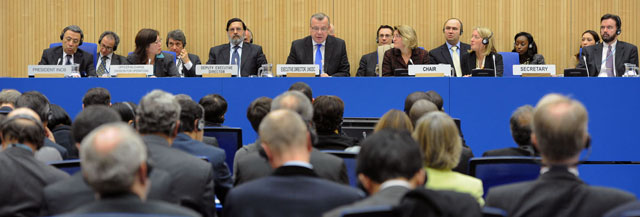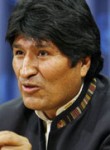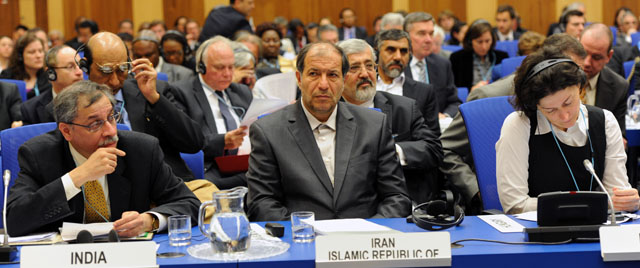God and His Messiah Jesus Christ our Lord - our right and duty to witness to Him: CIA DEA Drug Dealing
Look up, your redemption is at hand: The New American: The Grasp of Socialist International
President of Bolivia Insists in Legalization of Use of Coca Leaves « Kawther Salam

Kawther Salam, VIENNA, 12 March 2012. At the opening of the 55th session of the Commission on Narcotic Drugs (CND) which is meeting in Vienna from 12 to 16 March, the President of Bolivia, Mr. Evo Morales Ayma, asked the international community to assist his country in correcting a historical error that was committed against the Bolivian people when the government of dictator Banzer ratified the International Convention Against Narcotic Drugs of 1961 without reservations. He explained that his Government is vigorously combating cocaine trafficking and has destroyed tons of the drug. He said that his country needs more international assistance to combat the scourge, particularly equipment and technology.
country in correcting a historical error that was committed against the Bolivian people when the government of dictator Banzer ratified the International Convention Against Narcotic Drugs of 1961 without reservations. He explained that his Government is vigorously combating cocaine trafficking and has destroyed tons of the drug. He said that his country needs more international assistance to combat the scourge, particularly equipment and technology.
However, Bolivia has decided to “denounce” (withdraw from) the 1961 Single Convention on Illicit Drugs in order to “correct the historic error” concerning the indigenous uses of the coca leaf and the stigmatization of the Coca plant. Bolivia will re-accede to the Convention but this time including a reservation allowing the traditional consumption of coca leaf, which is a tradition which his people has kept for thousands of years, he said.
President Morales stated: “I want to stress that at no time Bolivia has acted untimely or irresponsibly. Instead, our request for re-accession to the treaty with reservation seeks to normalize our relations with the convention and the institutional mechanisms that result from it, including the INCB (International Narcotics Control Board) so that international cooperation and the country can focus on substance, on what is important, ie. on the progress and challenges related to the fight against drug trafficking”.
The Opening Session was attending by several hundreds of diplomats and high government officials from many countries. Among them was the President of Bolivia, Evo Morales Ayma, the Vice President of Honduras, the Vice Minister in the Ministry of Narcotics Control of Pakistan, the Vice Minister of Foreign Affairs of Guatemala, Ruth Dreifuss, the former President of Switzerland, Victor Hugo Barnica, the Counter Narcotics Minister of Afghanistan, Zarar Ahmad Moqbel-Osmani, the Justice Minister of Brazil, Jose Eduardo Cardozo, the Interior Minister of Iran, Mostafa Mohammad Najjar, the Minister to the Prime Minister’s Office of Lao People’s Democratic Republic, Soubanh Srithirath, the Secretary of State in the Ministry of Health of Spain, Juan Manuel Moreno Bonilla, and the Counter Narcotics heads of the Russian Federation, the United States of America, Peru, Kazakhstan, Saudi Arabia, Germany and France amongst others. Princess Bajrakitiyabha Mahidol of Thailand will also be attending the CND.
UN Drugs Chief Calls for Stronger Cooperation Frameworks and Attention to Health as Way Forward for International Drugs Policy
UNIS -Yury Fedotov, Executive Director of the United Nations Office on Drugs and Crime (UNODC) said during the opening session: “We face a transnational threat of extraordinary proportions that amounts to US$320 billion or some 0.5 per cent of global GDP”.
said during the opening session: “We face a transnational threat of extraordinary proportions that amounts to US$320 billion or some 0.5 per cent of global GDP”.
He added: stronger regional cooperation networks are vital for confronting the threat of illicit drugs. Fedotov stressed, Ministers and anti-drug officials from the 53 CND Member States will consider issues of concern, including the availability of narcotic drugs and psychotropic substances for medical and scientific purposes and preventing the diversion of chemicals for the manufacture of illicit drugs. The CND is the central policy-making body within the United Nations system dealing with illicit drugs.
 The Executive Director urged States to intensify prevention strategies as part of a comprehensive response to drug demand, supply and trafficking. “At present, the balance between our work on the supply and demand sides stays firmly in favour of the supply side. We must restore the balance. Prevention, treatment, rehabilitation, reintegration and health have to be recognized as key elements in our strategy,” he said. “Overall, our work on the treatment side must be considered as part of the normal clinical work undertaken when responding to any other disease in the health system.”
The Executive Director urged States to intensify prevention strategies as part of a comprehensive response to drug demand, supply and trafficking. “At present, the balance between our work on the supply and demand sides stays firmly in favour of the supply side. We must restore the balance. Prevention, treatment, rehabilitation, reintegration and health have to be recognized as key elements in our strategy,” he said. “Overall, our work on the treatment side must be considered as part of the normal clinical work undertaken when responding to any other disease in the health system.”
Mr. Fedotov exhorted States to recognize that drug dependence was an illness; evidence shows that treatment is more effective than repression in addressing a public health challenge that takes some 250,000 lives annually. He noted that children were vulnerable to the effects of drugs and to protect them it was important to use family-based prevention methods.
In this, the centenary of the signing of the International Opium Convention in 1912, the first legal instrument on drug control, the Executive Director said it was important to recognize the gains made over that time but more needed to be done. He said the international drugs conventions provided the best way to mitigate the negative effects of illicit drugs on individuals and communities, while ensuring that those in need can obtain life-saving medications.
March 13th, 2012 | Tags: 55th session of the Commission on Narcotic Drugs (CND), dictator Banzer, Evo Morales Ayma, Executive Director of the United Nations Office, INCB, Mostafa Mohammad Najjar, Yury Fedotov | Category: Conference, Convention, Drugs, Foreign Ministers, Spain, UN, Vienna
Look up, your redemption is at hand: The New American: The Grasp of Socialist International
President of Bolivia Insists in Legalization of Use of Coca Leaves « Kawther Salam
President of Bolivia Insists in Legalization of Use of Coca Leaves

Kawther Salam, VIENNA, 12 March 2012. At the opening of the 55th session of the Commission on Narcotic Drugs (CND) which is meeting in Vienna from 12 to 16 March, the President of Bolivia, Mr. Evo Morales Ayma, asked the international community to assist his
 country in correcting a historical error that was committed against the Bolivian people when the government of dictator Banzer ratified the International Convention Against Narcotic Drugs of 1961 without reservations. He explained that his Government is vigorously combating cocaine trafficking and has destroyed tons of the drug. He said that his country needs more international assistance to combat the scourge, particularly equipment and technology.
country in correcting a historical error that was committed against the Bolivian people when the government of dictator Banzer ratified the International Convention Against Narcotic Drugs of 1961 without reservations. He explained that his Government is vigorously combating cocaine trafficking and has destroyed tons of the drug. He said that his country needs more international assistance to combat the scourge, particularly equipment and technology.However, Bolivia has decided to “denounce” (withdraw from) the 1961 Single Convention on Illicit Drugs in order to “correct the historic error” concerning the indigenous uses of the coca leaf and the stigmatization of the Coca plant. Bolivia will re-accede to the Convention but this time including a reservation allowing the traditional consumption of coca leaf, which is a tradition which his people has kept for thousands of years, he said.
President Morales stated: “I want to stress that at no time Bolivia has acted untimely or irresponsibly. Instead, our request for re-accession to the treaty with reservation seeks to normalize our relations with the convention and the institutional mechanisms that result from it, including the INCB (International Narcotics Control Board) so that international cooperation and the country can focus on substance, on what is important, ie. on the progress and challenges related to the fight against drug trafficking”.
The Opening Session was attending by several hundreds of diplomats and high government officials from many countries. Among them was the President of Bolivia, Evo Morales Ayma, the Vice President of Honduras, the Vice Minister in the Ministry of Narcotics Control of Pakistan, the Vice Minister of Foreign Affairs of Guatemala, Ruth Dreifuss, the former President of Switzerland, Victor Hugo Barnica, the Counter Narcotics Minister of Afghanistan, Zarar Ahmad Moqbel-Osmani, the Justice Minister of Brazil, Jose Eduardo Cardozo, the Interior Minister of Iran, Mostafa Mohammad Najjar, the Minister to the Prime Minister’s Office of Lao People’s Democratic Republic, Soubanh Srithirath, the Secretary of State in the Ministry of Health of Spain, Juan Manuel Moreno Bonilla, and the Counter Narcotics heads of the Russian Federation, the United States of America, Peru, Kazakhstan, Saudi Arabia, Germany and France amongst others. Princess Bajrakitiyabha Mahidol of Thailand will also be attending the CND.
UN Drugs Chief Calls for Stronger Cooperation Frameworks and Attention to Health as Way Forward for International Drugs Policy
UNIS -Yury Fedotov, Executive Director of the United Nations Office on Drugs and Crime (UNODC)
 said during the opening session: “We face a transnational threat of extraordinary proportions that amounts to US$320 billion or some 0.5 per cent of global GDP”.
said during the opening session: “We face a transnational threat of extraordinary proportions that amounts to US$320 billion or some 0.5 per cent of global GDP”.He added: stronger regional cooperation networks are vital for confronting the threat of illicit drugs. Fedotov stressed, Ministers and anti-drug officials from the 53 CND Member States will consider issues of concern, including the availability of narcotic drugs and psychotropic substances for medical and scientific purposes and preventing the diversion of chemicals for the manufacture of illicit drugs. The CND is the central policy-making body within the United Nations system dealing with illicit drugs.

Mr. Fedotov exhorted States to recognize that drug dependence was an illness; evidence shows that treatment is more effective than repression in addressing a public health challenge that takes some 250,000 lives annually. He noted that children were vulnerable to the effects of drugs and to protect them it was important to use family-based prevention methods.
In this, the centenary of the signing of the International Opium Convention in 1912, the first legal instrument on drug control, the Executive Director said it was important to recognize the gains made over that time but more needed to be done. He said the international drugs conventions provided the best way to mitigate the negative effects of illicit drugs on individuals and communities, while ensuring that those in need can obtain life-saving medications.
March 13th, 2012 | Tags: 55th session of the Commission on Narcotic Drugs (CND), dictator Banzer, Evo Morales Ayma, Executive Director of the United Nations Office, INCB, Mostafa Mohammad Najjar, Yury Fedotov | Category: Conference, Convention, Drugs, Foreign Ministers, Spain, UN, Vienna

No comments:
Post a Comment